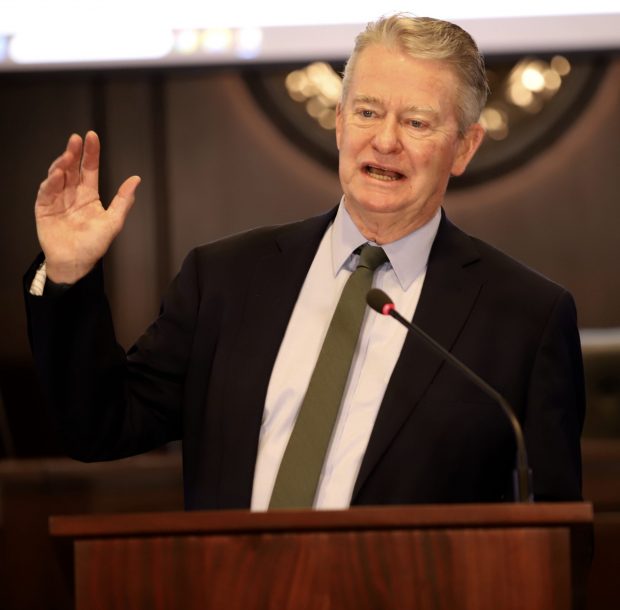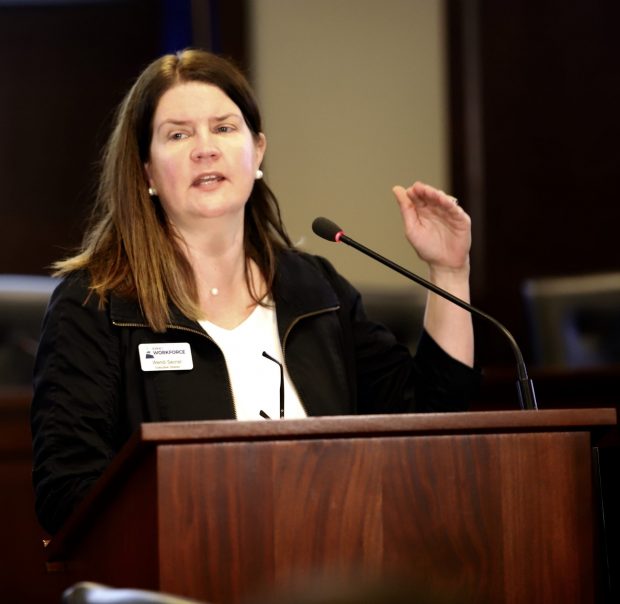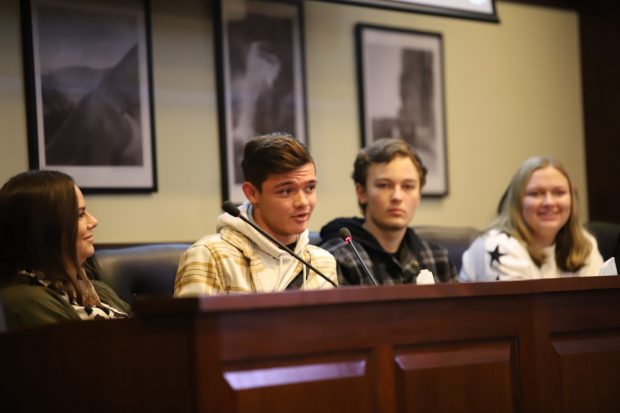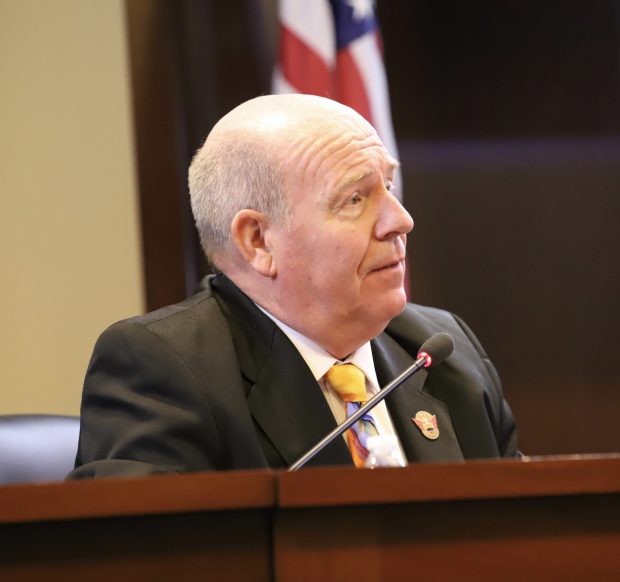In less than three months, more than 12,500 high school seniors have applied for Idaho Launch grants — and that means the state probably won’t have enough money to go around.

Joined by a trio of Launch applicants from Kuna High School, Gov. Brad Little touted the success of the $75 million initiative Thursday, and took an early victory lap. For months, Little and other state leaders have crisscrossed Idaho, pitching students and school counselors about Launch, which will provide high school grads up to $8,000 for college or job training. “Awareness was very low when we first started,” Little said during a legislative preview, sponsored by the Idaho Press Club.
But while Launch is a big hit with Idaho’s graduating class of 2024, some lawmakers remain skeptical. Minutes after Little touted Launch, House Speaker Mike Moyle restated his opposition, and said the grant program could turn into a “money pit.”
The 2024 legislative session opens Monday — and some lawmakers will probably try to tweak the fledgling program.
The early application numbers
The Launch dollars won’t go out until July 1, after seniors graduate from high school. But the state began taking applications on Oct. 2.
The state reported early Launch numbers to the Legislature this week — weeks after Idaho Education News began requesting updates on the fledgling programs. According to the first round of numbers, made public Thursday, the traffic has greatly exceeded expectations:
- As of last week, 12,588 seniors have applied for grants. That represents more than half of Idaho’s 24,000 seniors. State officials had been expecting about 7,500 applications by the end of the year.
- Applications have come from every school district that has a high school. In both West Ada and Boise, Idaho’s two largest districts, 43% of students have applied for a share of the money. In the rural Bruneau-Grand View district, every senior applied for a Launch grant.
- Female students account for 53% of Launch applications, but this represents “a closing of the gap,” said Wendi Secrist, executive director of the Workforce Development Council, the state agency which is overseeing Launch. For years, Idaho has struggled to convince male high school grads to continue their education.
- Latino students account for 18% of applicants — a rate that falls slightly below overall student demographics.
The surge of applications has forced the state to set priorities.

Idaho has offered about 6,700 “contingent awards,” focusing on students who want to pursue in-demand careers. That represents about two-thirds of the seniors who applied by Nov. 30.
“It was very hard to not offer everyone (a grant),” Secrist said Thursday.
The state will take Launch applications in two more waves, ending Feb. 15 and April 15. Depending on how many students apply — and ultimately accept the grants — some seniors on the waitlists might still get a share of the money, Secrist said.
‘It’s becoming a bigger deal’
At Thursday’s legislative preview, Little was slated to take an hour’s worth of questions from Statehouse reporters. But he spent much of that time touting Launch — and shared the microphone with a lineup of other speakers.
The guest list included three Kuna seniors who already have career plans aligned to Launch grants. And the seniors said they had to overcome some initial skepticism, as they learned Launch was not a typical college scholarship program.

“It’s becoming a bigger deal, and more real than it was when we all applied,” said Mataio Jenkins, who plans to pursue training as a dental assistant.
Lt. Gov. Scott Bedke also said Launch has challenged some of his own preconceptions. Like Little, Bedke has traversed the state talking about the program. One stop took Bedke to an Idaho Falls alternative high school; the 78 seniors were seated in the gymnasium, but many appeared disinterested. “I went in with some stereotypes,” Bedke told reporters.
But as the students learned they could use Launch to pursue an education in anything from diesel mechanics to cosmetology, many students began leaning into the possibilities.
“They saw a glimpse of how they could be more successful,” Bedke said.
‘Government handouts generally don’t work too well’
On Thursday, Little was quick to mention Launch as one of the highlights of the 2023 legislative session. But Little skirted what would have been a resounding defeat. The first Launch bill passed the House by a scant 36-34 majority. Subsequent bills narrowly passed the House and the Senate.
When four legislators addressed Statehouse reporters Thursday morning, the comments on Launch cut across ideological lines. Senate Minority Leader Melissa Wintrow and House Assistant Minority Leader Lauren Necochea, both D-Boise, said they hoped critics will come around.
Moyle, R-Star, restated his objections.

“Government handouts generally don’t work too well, and this is a big government handout,” said Moyle, who likened Launch to the state’s Medicaid expansion program. “If (Launch is) done wrong, it will just be a money pit.”
Sen. Lori Den Hartog also opposed Launch last year. And the Meridian Republican said the Workforce Development Council’s list of in-demand careers — the linchpin for awarding Launch grants — was “incredibly disappointing,” since it lists office clerical work as the state’s most in-demand career.
Den Hartog predicted the Legislature would try to tweak Launch. “I think that’s going to be a discussion in the building, and we still need to fund it.”
The funding question will begin to unfold in the next few days. Money for Launch now comes from an $80 million-a-year fund to support training for in-demand careers. Little on Thursday declined to say whether he will seek additional funding; he will lay out his budget requests on Monday, when he opens the session with his State of the State address.
The structure of Launch could also be open to debate, a sponsor of the original Launch bill said Thursday.
“There’s the potential for a couple of tweaks,” said House Majority Leader Megan Blanksma, R-Hammett, after she listened to the legislative panel discussion.
Blanksma said lawmakers might rework the process of ranking in-demand careers — and reconsider whether the Workforce Development Council should continue to draw up the list.
But Blanksma added that there has been some confusion about the in-demand list. Despite what the list says, the state will not give money to graduates looking for office clerical work, since those jobs require no training beyond high school. Instead, the state’s money will go to students pursuing careers in health care, engineering, or other fields that require specific training.
